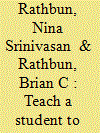| Srl | Item |
| 1 |
ID:
121416


|
|
|
|
|
| Publication |
2013.
|
| Summary/Abstract |
The early- to mid-1940s leading to the establishment of the United Nations have often been cited by historians and international relations scholars as a critical historical juncture where the concept of Great Power responsibility became institutionalised into the fabric of international society. How such a concept came about, however, and how ideas about their roles and responsibilities were debated and projected by the Great Powers themselves, have been given less prominence in the literature. In particular, China's role in negotiating a post-Second World War order has been largely neglected. This analysis thus explores projections of China's Great Power role as well as examines how China conceptualised, negotiated, and used notions of Great Power responsibility and how this interplayed with wider notions in international society. Despite the operational constraints China faced, there was more Chinese agency and deliberation than is traditionally portrayed, with China bringing some important ideas to the negotiating table.
|
|
|
|
|
|
|
|
|
|
|
|
|
|
|
|
| 2 |
ID:
117446


|
|
|
|
|
| Publication |
2012.
|
| Summary/Abstract |
After sixty-five years of pursuing a grand strategy of global leadership-nearly a third of which transpired without a peer great power rival-has the time come for the United States to switch to a strategy of retrenchment? According to most security studies scholars who write on the future of U.S. grand strategy, the answer is an unambiguous yes: they argue that the United States should curtail or eliminate its overseas military presence, abolish or dramatically reduce its global security commitments, and minimize or eschew efforts to foster and lead the liberal institutional order. Thus far, the arguments for retrenchment have gone largely unanswered by international relations scholars. An evaluation of these arguments requires a systematic analysis that directly assesses the core claim of retrenchment advocates that the current "deep engagement" grand strategy is not in the national interests of the United States. This analysis shows that advocates of retrenchment radically overestimate the costs of deep engagement and underestimate its benefits. We conclude that the fundamental choice to retain a grand strategy of deep engagement after the Cold War is just what the preponderance of international relations scholarship would expect a rational, self-interested leading power in America's position to do.
|
|
|
|
|
|
|
|
|
|
|
|
|
|
|
|
| 3 |
ID:
156205


|
|
|
|
|
| Summary/Abstract |
American higher-education institutions are under increasing pressure to prepare their students with practical skills for the workplace, and the social sciences—including political science—are not immune. Political figures have suggested—sometimes seconded by academics themselves—that research distracts academics from imparting practical skills to undergraduate students. Using a survey of international relations (IR) scholars, this article shows that this is not the case. Those who spend more time on research actually devote more time to policy-relevant research in their courses than more abstract and theoretical work, and they incorporate more contemporary issues. Research seems to encourage academics to teach their students to fish.
|
|
|
|
|
|
|
|
|
|
|
|
|
|
|
|